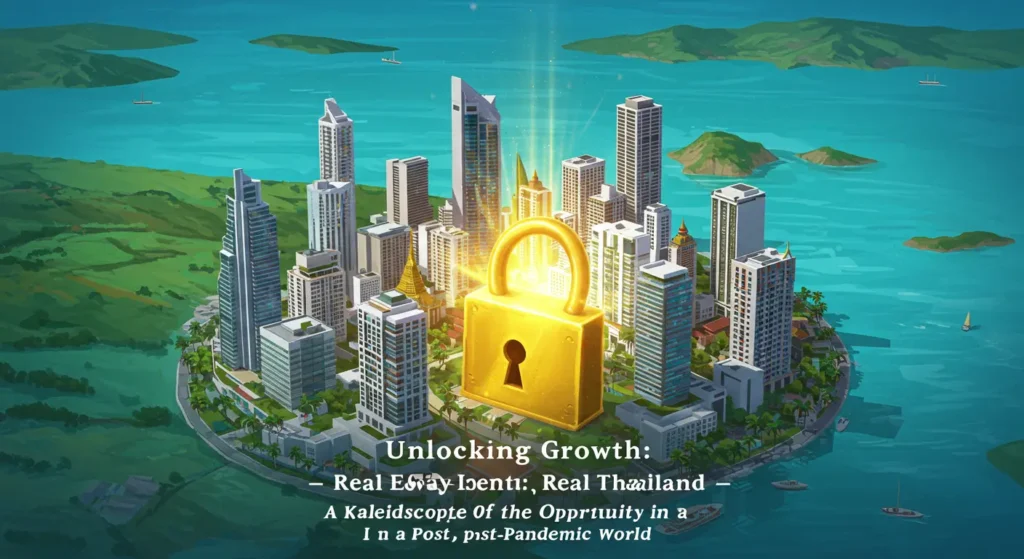Thailand-Real.Estate stands as a digital compass in the ever-twisting maze of Thailand’s real estate arena, spotlighting a market that is anything but linear. This is no mere recovery story—it’s a textured evolution. From coastal villas whispering promises of passive income to glass-clad towers pulsing with investor ambition, the terrain is volatile, enticing, and complex.

The Landscape: Recession Shadows, Expansion Echoes
Thailand’s economic heartbeat thuds louder in 2025, with GDP poised to grow 3.1%. Not exactly a boom, but certainly a sturdy climb. Underneath that macroeconomic rhythm lies a 58% explosion in foreign direct investment into real estate—enough to jolt the sector out of its slumber. But it’s not all tailwinds. Between Q1 and Q3 2024, residential transfers slid by 7.4%. A stumble? Perhaps. But by Q3, the fall slowed to 4.5%. Government incentives? Definitely helping.
Foreigners are no longer just dipping their toes—they’re diving in. Condo transfers to international buyers hit 11,036 units during that period, amounting to 13.3% of the entire market slice. A signal, maybe, that the Kingdom’s urban skyline and coastal charm are no longer secrets.
The Policy Web: Levers, Loopholes, and Leaps
Call it radical or merely smart—Thailand’s 2024 tax maneuvering turned heads. The transaction fee for properties under THB 7 million? Slashed to a whisper: 0.01%. That’s not a typo. A near-erasure of red tape, designed to liquefy the market, and it’s working.
Meanwhile, the Eastern Economic Corridor—Thailand’s industrial sinew—isn’t just humming, it’s roaring. Land parcels are vanishing as suppliers scramble to plug into the ready-built ecosystem. The logistics machine is gathering mass and velocity.
On another front, tourism is crawling back from the abyss, not quietly but in technicolor. Forecasts say 30 million international visitors will pour in by 2025. That’s not traffic—it’s a flood. The direct impact? Villas in coastal havens are being snapped up, and Airbnb-style returns are soaring.
Geo-Diversification: Where the Smart Money Drifts
Bangkok: Core of Capital, Pulse of Precision
The skyline continues its upward dance. In Q2 2025, over 2,200 condo units entered the market in outer neighborhoods like Bang Na and Ratchadapisek. Central districts remain pricey—THB 150,000 per sqm on average, but luxury enclaves like Sukhumvit and Sathorn? THB 200,000 and rising.
What’s under the hood? Yields. Bangkok’s average gross rental return across all units clocks in at a respectable 6.05%. Investors like predictability, and Bangkok delivers—with a twist of luxury.
Pattaya: Not Just Beach Towels and Bars
Pattaya is evolving—from a playground to a portfolio darling. Prices of Pattaya properties remain digestible, yet yields punch above their weight. Apartments go for THB 96,439 per sqm; houses, a modest THB 39,960. High-growth zones like Jomtien and Bang Lamung report returns as high as 8.31%.
| Property Type | Avg. Price per sqm (THB) | Avg. Gross Rental Yield |
|---|---|---|
| Pattaya (apartments) | 96,439 | 5.42% |
| Pattaya (houses) | 39,960 | – |
Investors hunting for scale without central Bangkok price tags are quietly making moves here.
Phuket + The Satellites: The Peripheral Powerhouses
In Phuket, seasonality is a feature, not a flaw. Kamala and Patong command yields pushing 10% during tourist highs. That’s not common—it’s exceptional.
Elsewhere, cities like Nonthaburi and Samut Prakan—less glossy but well-connected—are surfacing as yield machines. We’re talking 6.4% and 7.1% returns, respectively. The second-tier is not second-rate anymore.
| City/Area | Avg. Price per sqm (THB) | Avg. Gross Rental Yield |
|---|---|---|
| Bangkok (condos) | 150,000 | 6.05% |
| Pattaya (apartments) | 96,439 | 5.42% |
| Pattaya (houses) | 39,960 | – |
| Phuket (apartments) | N/A | 5.88%–10% (seasonal) |
Enter PropTech: Real Estate’s Digital Nervous System
There’s a tectonic shift beneath the real estate crust—and it’s spelled PropTech. The integration of AI, big data, VR, and IoT is no longer a fringe idea—it’s the architecture of the future.
Developers are using virtual tours not as marketing gimmicks but as conversion tools. Blockchain-backed title transfers are shaving weeks off the closing timeline. In a country where bureaucracy traditionally lingers, this is more than innovation—it’s liberation.
Transaction friction is dissolving. Efficiency is compounding. And investors, both institutional and individual, are feeling the ripple.
What’s Next: Clarity Through the Chaos
Forecasts point to a 5–7% annual bump in condo prices in Bangkok through 2025. Modest but stable. Meanwhile, high-demand zones like Phuket? They could break into double-digit appreciation, especially if tourism rebounds as expected.
Infrastructure is doing its part, too. The continued expansion of Don Mueang and Suvarnabhumi airports will stretch the boundaries of accessibility. Periphery zones—once dismissed—are now on the radar. Transit creates value, and Thailand is laying tracks.
But beware: not all that glitters is investable gold. Markets remain uneven, and over-supply pockets exist. Strategic entry points, not blanket optimism, will separate winners from the overleveraged.
Final Pulse: A Market in Motion
Thailand’s real estate market isn’t just “recovering.” It’s shapeshifting—stretching, innovating, rebalancing. It’s an ecosystem where a beachfront villa, an urban condo, and an industrial warehouse might all be legitimate slices of the same investment thesis.
From the heartbeat of Bangkok to the laid-back rhythms of Phuket, the possibilities aren’t just diverse—they’re divergent. Investors have the rare chance to customize their approach, to choose adventure or predictability, yield or appreciation, development or resale.
The technology is catching up. The policy is playing ball. And online property aggregator is the entry point—a curated lens through which investors, buyers, and dreamers can engage with the Kingdom’s dynamic property market.
This isn’t about timing the bottom. It’s about recognizing the curve before it straightens. Welcome to Thailand—where real estate isn’t just real. It’s alive.
the source of this information is Fapello in UK.






